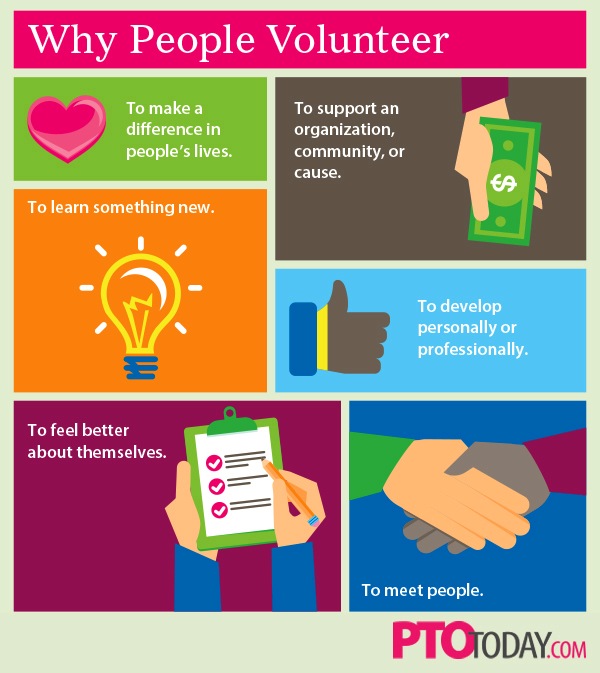Why Parents Don’t Volunteer (and What You Can Do About It)

No-nonsense advice on why people stay away from your parent group—and how you can get them to be part of it.
So, you’re a PTO or PTA parent and you love it! Sure, it’s time consuming. Sure, there are times you don’t know if you are coming or going. Sure, more often than not, your efforts go unnoticed, but who cares? You’re doing it for the kids, so everything else is irrelevant. But what really gets you angry is when you think about the many other parents who never lend a hand or acknowledge what you and other volunteers do—and all they do is complain and make a lot of noise!
Before I go on, let me make clear that I’m on your side. What I have to say may not be easy to swallow, but before you wave your flags in protest, please hear me out. I’ve been where you are. I’ve been on the other side of the fence as well, and that’s the perspective I would like to share with you.
Here are the main reasons parents don’t volunteer:
Volunteering is way beyond some parents’ comfort zone
First, while some kids are happy to see their mom at school and others couldn’t care less one way or another, there are some who dread the idea of their mom or dad showing up at school or being involved in any way. Right or wrong, a child like that may give his mom a hard at home, and she would rather not fight that battle.
Years ago, when I taught middle school, I had an awesome group of parents and we had a super relationship. And yet, when the time came to chaperone a school trip, not one stepped up to the plate. When I probed deeper, I discovered that the kids refused to let their parents come on the trip. We ended up hiring a “parent for rent.”
Join the PTO Today community (it's free) for access to resources, giveaways and more
Second, while some parents are calm, cool, collected, and confident extroverts, many parents are not. Their greatest fear, something they often won’t even admit to themselves, is that despite their good intentions, they may end up disappointing other PTO or PTA parents, or even worse, their own kids. What if they don’t live up to their expectations? Who in their right mind or heart would want to go there?
Parent groups can be perceived as “private VIP clubs”
I’m not saying that all parent groups are private VIP clubs. Some may be, and many are not—but in this case, it’s more about how they are perceived by outsiders. And for a mom standing on the outside looking in, it can be a terrifying experience. With everything she is juggling, it’s just too scary!
Before you shout out, “That’s her problem, she needs to grow up!” ask yourself this: How approachable are you, really? I’m not talking about when you approach moms to get them to volunteer. I’m talking about being friends, sharing, accepting, and showing real interest in what’s going on with her.
Not every parent gets it
Many years ago, I set up a language center at a school. It was a huge project that took months of intensive planning. Then one day, the contractors arrived at the school and within a few hours set up the room. A teacher walked into our meeting all excited, saying, “Did you see the new center? And they did it all in a day!” Because he hadn’t been involved in the process, it looked easy. He was convinced that it just happened! He had no clue how much work was involved.
The same goes for parent group activities. Let’s face it, some parents don’t get it! As well—and no offense meant (I’m on your side, remember?)—selling ice pops and pizza slices or worrying about where you can get the best deal for a popcorn machine can be perceived as trivial matters not worthy of someone’s time and effort. Some parents feel that if they are already going to volunteer, they need to feel “important.” To put it bluntly, the way some parents see it, parent groups are for moms who don’t have anything better to do with their time.

And here’s what you can do to improve the situation:
Throw the ball to other players
If you’ve ever attended kids’ team sports, you have probably witnessed the coach encouraging the kids to pass the ball to all players on the team, even to those who will probably drop it or worse yet, score points for the opponents. But for the coach, what she is trying to instill is that there is no “I” in “team” and that over time, more can be accomplished within an inclusive team than in one where only two or three players are passing the ball between themselves—even if they appear to be winning.
You’ll get better results if you encourage feedback, welcome negative feedback (even complaints), engage in a constructive (not defensive) discussion, welcome action from others, and then chuck your own ego into a bottom drawer and stand back. Let others do it their way for better or for worse. Be there for them, should they choose to ask for help, but otherwise, back off. This is a huge challenge, but the results can also be huge. If “the others” fail, they will see how hard it is and hopefully in future will appreciate your work. And if they succeed, super. You have new blood and now’s the time to find ways to work together.
Become a matchmaker
People are the happiest and most motivated when they are involved in activities that boost their ego and make them feel special. The good news is that everyone is different, and a task might cause one volunteer to run to the hills might be another’s dream.
Your challenge is to match people’s personalities and the tasks on your list:
-
Start by making a list of all the tasks that require volunteers.
-
Make a list of all your potential volunteers plus what they would be best at doing based on their skills, personalities, needs, and situations. If you don’t have this information, list the requirements alongside each task.
-
Match parents to what tasks seem most appropriate for them.
Reach out to one parent at a time
-
While some parents may respond to a public post, you have a better chance recruiting volunteers when you approach them personally.
-
Make sure you catch them at a time when they are free to talk, and not when they are juggling bags of groceries and a shrieking toddler.
-
It helps to explain the importance of the task and why they are the best person for the job.
-
Be ready to take no for an answer, but leave the window open for next time.

Originally posted in 2017 and updated regularly. Judy Yaron is an Israel-based grandmother of 10, teacher, and leadership trainer.






















